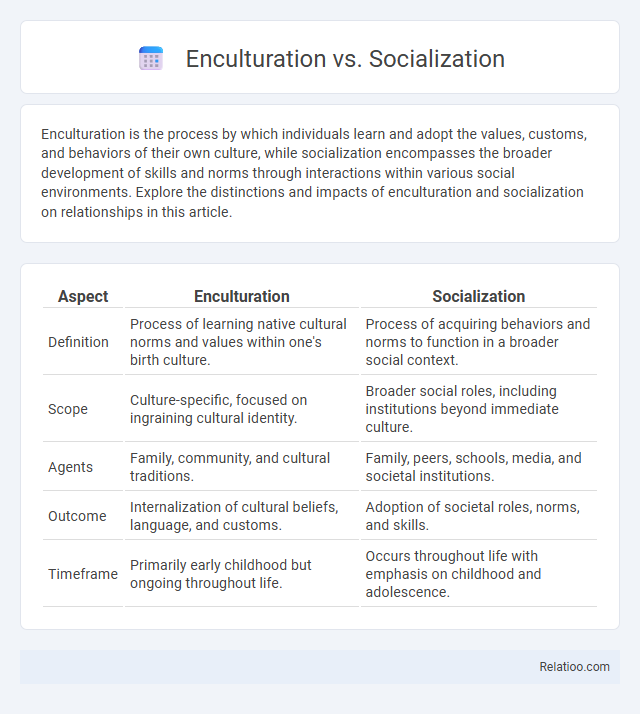Enculturation is the process by which individuals learn and adopt the values, customs, and behaviors of their own culture, while socialization encompasses the broader development of skills and norms through interactions within various social environments. Explore the distinctions and impacts of enculturation and socialization on relationships in this article.
Table of Comparison
| Aspect | Enculturation | Socialization |
|---|---|---|
| Definition | Process of learning native cultural norms and values within one's birth culture. | Process of acquiring behaviors and norms to function in a broader social context. |
| Scope | Culture-specific, focused on ingraining cultural identity. | Broader social roles, including institutions beyond immediate culture. |
| Agents | Family, community, and cultural traditions. | Family, peers, schools, media, and societal institutions. |
| Outcome | Internalization of cultural beliefs, language, and customs. | Adoption of societal roles, norms, and skills. |
| Timeframe | Primarily early childhood but ongoing throughout life. | Occurs throughout life with emphasis on childhood and adolescence. |
Understanding Enculturation and Socialization
Enculturation refers to the process through which individuals learn and adopt the cultural norms, values, and practices of their native society, often occurring in early childhood through family and community interactions. Socialization encompasses a broader scope, involving the acquisition of social skills, roles, and behaviors necessary for effective participation in society, influenced by various agents such as family, peers, education, and media. Understanding the distinction highlights that enculturation is a subset of socialization, specifically focused on cultural transmission, while socialization includes the overall development of social identity and societal conformity.
Definitions: Enculturation vs. Socialization
Enculturation is the process by which individuals learn and adopt the cultural norms, values, behaviors, and customs of their own society, typically occurring from early childhood through direct and indirect experiences. Socialization encompasses a broader framework where individuals acquire the skills, knowledge, and social norms necessary to function within various social institutions, including family, education, and peer groups. While enculturation specifically emphasizes cultural transmission within a particular group, socialization involves a wider range of social development and interaction beyond cultural learning.
Key Differences Between Enculturation and Socialization
Enculturation is the process by which individuals learn and adopt the values, customs, and norms of their own culture through direct interaction, while socialization encompasses a broader range of social learning that includes acquiring behaviors necessary for functioning within any social group. The key differences between enculturation and socialization lie in their scope and focus: enculturation centers specifically on cultural heritage and identity, whereas socialization involves learning societal roles, language, and social skills across various contexts. Understanding these distinctions helps you grasp how cultural transmission differs from social competence development.
The Role of Family in Cultural Transmission
The role of family in cultural transmission is central to both enculturation and socialization, where family members teach children norms, values, language, and traditions that shape their identity within a specific culture. Enculturation emphasizes the gradual internalization of cultural knowledge through everyday family interactions, while socialization includes acquiring broader societal roles and behaviors influenced by family dynamics. Your family's guidance is fundamental in embedding cultural heritage, ensuring continuity and adaptation across generations.
Agents of Socialization: Beyond the Family
Agents of socialization extend beyond the family to include schools, peer groups, media, and workplace environments, each shaping your behaviors, values, and norms. Enculturation specifically refers to the process through which individuals learn and internalize their native culture, often guided by family and cultural community. Socialization, in contrast, covers a broader scope involving the acquisition of societal norms and roles, influenced by diverse agents that prepare you to function effectively within your social world.
Impact of Enculturation on Identity Formation
Enculturation plays a crucial role in identity formation by transmitting cultural values, beliefs, and practices from one generation to the next, shaping an individual's worldview and sense of self. Unlike socialization, which encompasses broader social norms and behaviors learned from various social institutions, enculturation specifically embeds cultural heritage and traditions into personal identity. This deep cultural immersion fosters a strong connection to community and heritage, influencing language, customs, and moral frameworks that define an individual's cultural identity.
Socialization Processes in Diverse Societies
Socialization processes in diverse societies shape your identity by teaching norms, values, and behaviors essential for interacting within various cultural groups. Enculturation involves absorbing your native culture from birth, while socialization extends to acquiring skills and knowledge necessary for participating in multiple social institutions. This dynamic helps individuals navigate complex multicultural environments, promoting adaptability and social cohesion.
Enculturation Across Generations
Enculturation is the process by which cultural knowledge, values, and customs are transmitted across generations, ensuring the preservation and continuity of your heritage. Unlike socialization, which involves learning social norms and behaviors through direct interaction within broader society, enculturation emphasizes the subtle, often unconscious absorption of cultural identity within family and community settings. This intergenerational transfer of cultural frameworks shapes your worldview and social practices, maintaining cultural cohesion over time.
Challenges in Modern Enculturation and Socialization
Challenges in modern enculturation and socialization include the rapid influence of digital media, which alters traditional cultural transmission and social norms, and the increasing cultural diversity that complicates shared values and identity formation. The rise of virtual communities disrupts face-to-face interactions critical for social skill development, while globalization accelerates cultural change, causing generational gaps in cultural understanding. These dynamics create tension in maintaining cultural continuity and effective social integration in contemporary societies.
Enculturation and Socialization: Implications for Education
Enculturation involves the gradual acquisition of a group's cultural norms and values, shaping an individual's identity through immersion in their native culture, while socialization encompasses a broader process of learning behaviors and social skills necessary to function within society. In education, understanding the distinction between enculturation and socialization helps educators design curricula that respect students' cultural backgrounds while promoting constructive social interactions. Emphasizing enculturation supports cultural competence and a sense of belonging, whereas effective socialization fosters collaboration, communication, and adaptability in diverse educational settings.

Infographic: Enculturation vs Socialization
 relatioo.com
relatioo.com